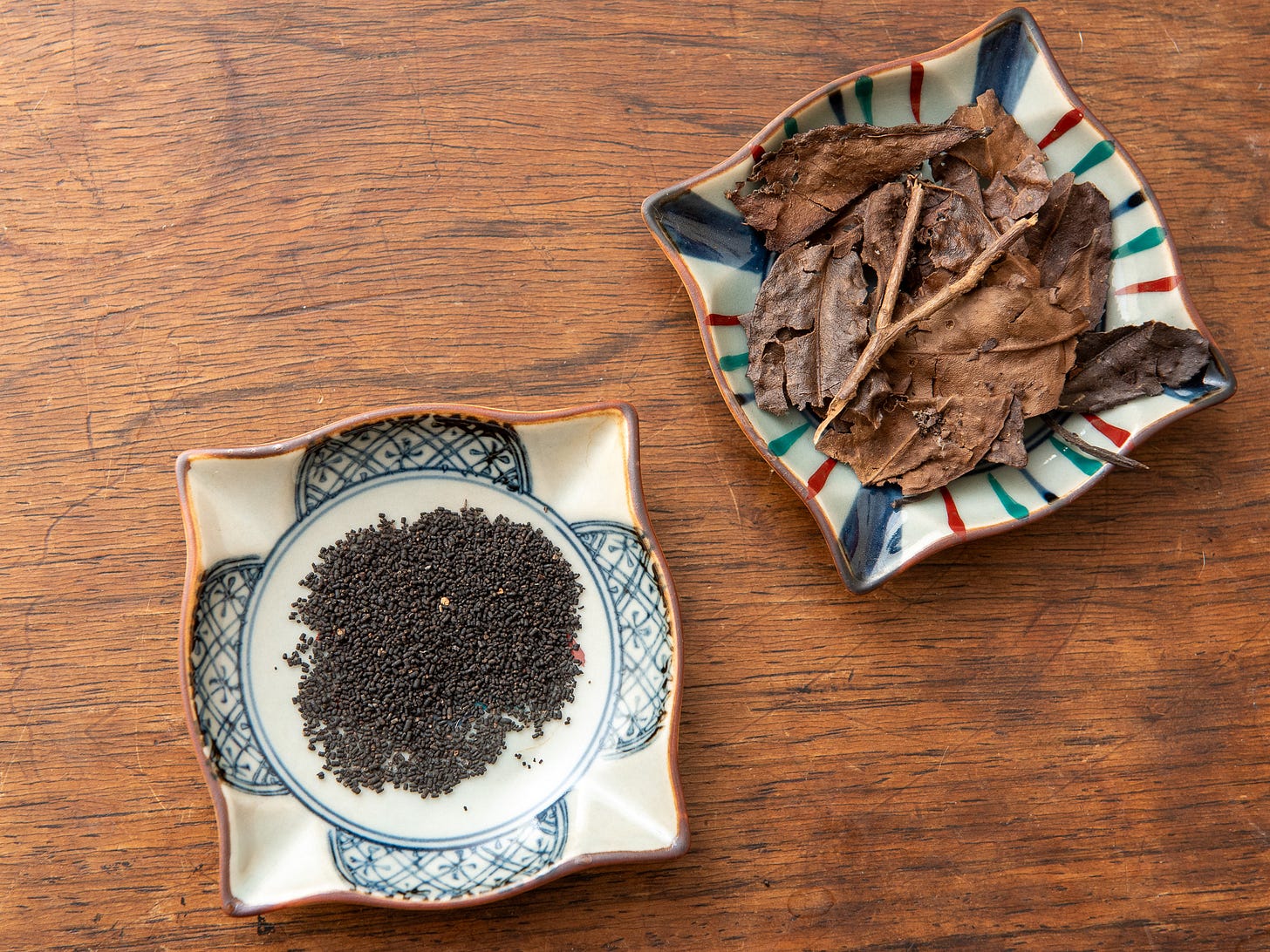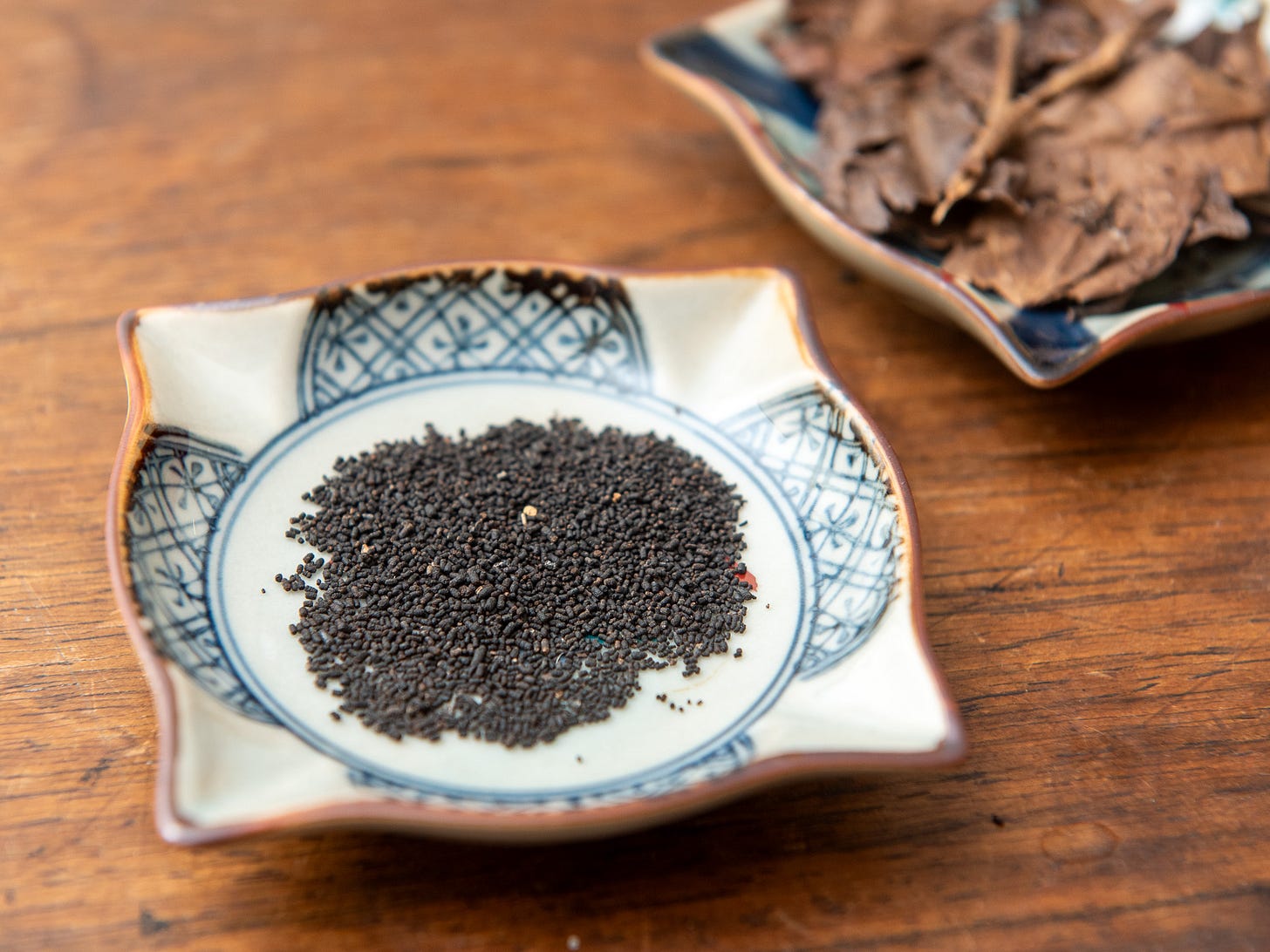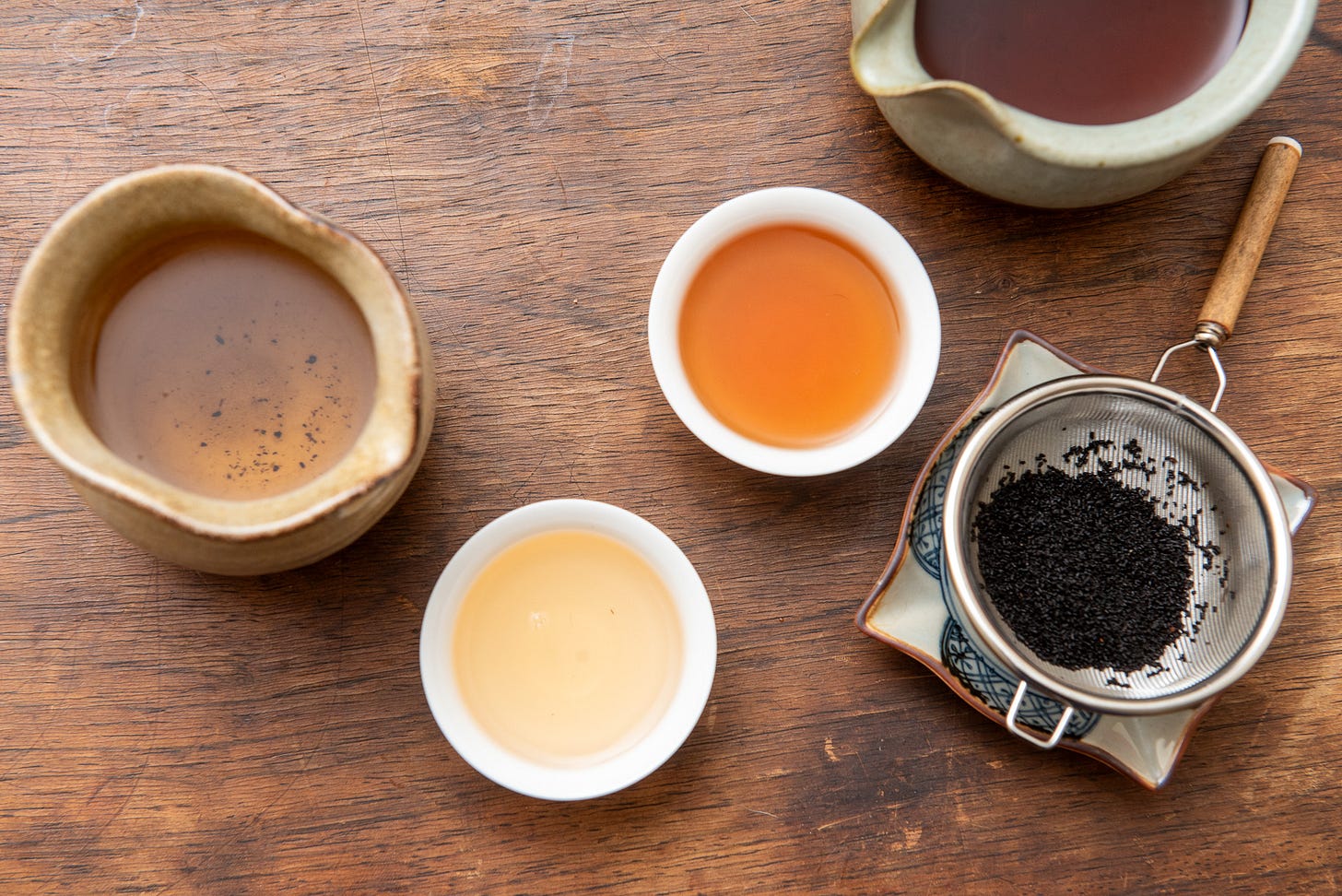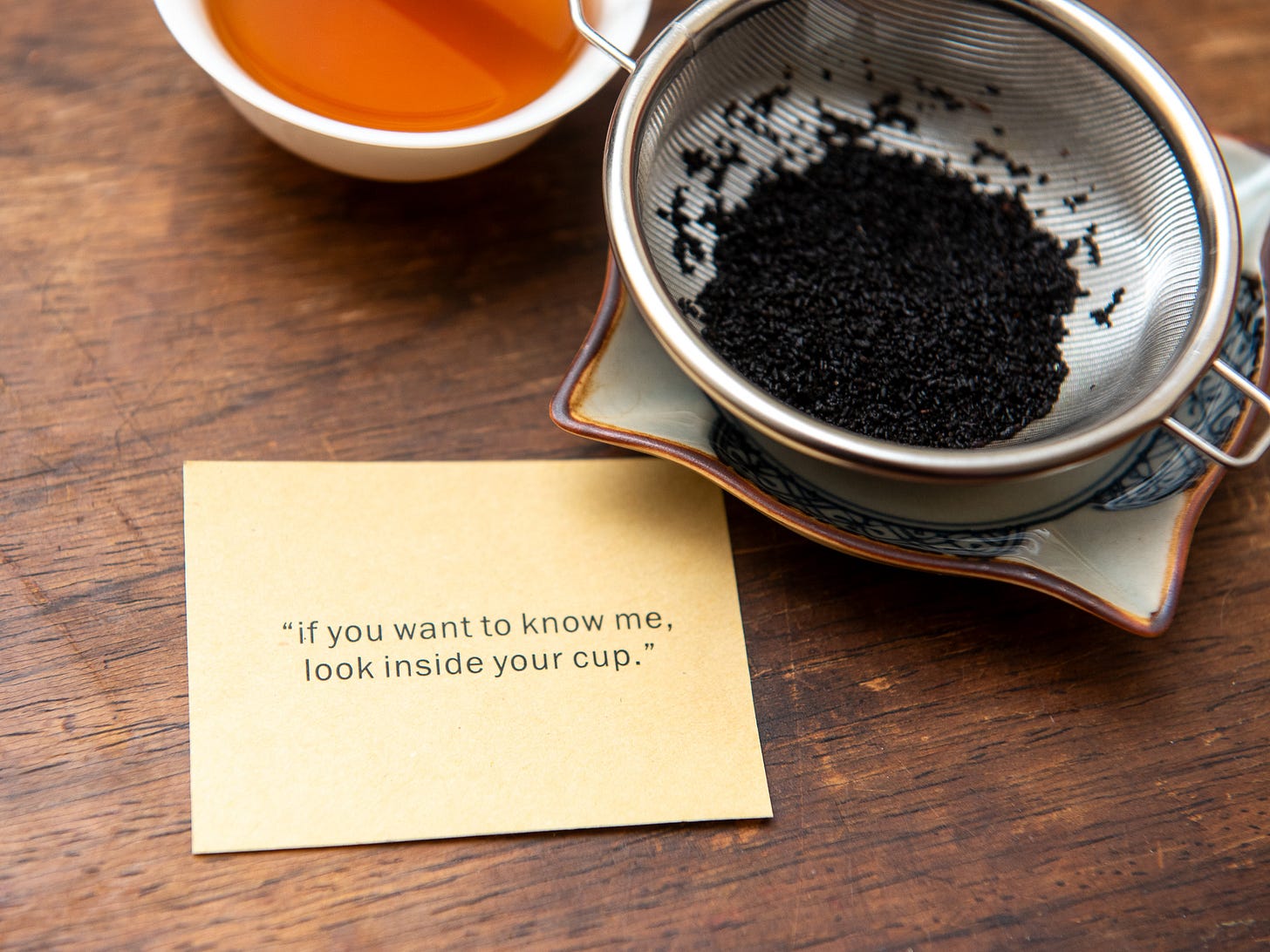Drink this if you feel pooped
The tea: Reincarnation chong shi cha, sold by Bardo. $35 for 1oz.
Traditional medicine comes in many forms. One of them is a tea made from bug poop, and you’re just going to have to be okay with that. “Reincarnation” is Bardo’s clever name for this batch of chong shi cha, which is a product of ethnic minority groups in southwestern China. It’s good and tasty to drink even for those in perfect health. If you sipped it blind, you’d never guess its fecal origins.
This poop tea begins as actual tea: a fermented and aged style called liu bao. The leaves are sprayed with rice water to attract moths. Those moths lay their eggs among the tea leaves, and when the eggs hatch, the newly born larvae have a feast of foliage awaiting them. These baby caterpillars are kept in strict isolation. They can eat all the tea they want, but they can’t escape to explore parts unknown. The tea maker collects poop from the caterpillars as they munch through the leaves. When a sufficient quantity of poop is obtained, the maker pan-fires the tiny droppings in a wok. This shelf-stable poop—the digested essence of liu bao tea—may be aged further to enhance its value. Finally it’s steeped into a medicinal brew said to settle the stomach and cool the body from excess heat, among other benefits.
The source: Bardos in Buddhism are transitional states between death and rebirth. Bardo in Portland, Oregon, is a small tea room run by tea guy Ravi Kroesen and mindfulness teacher / yoga instructor Veronika Vogler. The pair began selling tea online in 2023 before opening a tea room last year, where they offer gong fu tea service and sell a handsome collection of teaware. I was drawn to Bardo for their selection of liu bao. That’s a niche you don’t see often with American sellers, especially ones that have to pay for brick and mortar storefronts. Kroesen says that Vogler had been a longtime drinker of fermented teas before they met, and that liu bao’s woodsy, mushroomy vibe aligns with the regional palate: “there is a large contingent of shou [ripened] puer drinkers here on the West Coast.” I’ve enjoyed many of Bardo’s teas—not just the liu bao—and think you can get a good sense of Kroesen’s palate from the tea he sells. I love it when you can taste a seller’s personality in their teas.
To brew: A little chong shi cha goes a long way. Place a teaspoon in a fine mesh strainer and set it on a cup or pitcher. Pour boiling water over the top, discarding the initial rinse. You can also steep the chong shi cha in a pot for a stronger brew. Either way, it’s good for 6 to 8 infusions. The flavor is smooth, sweet, and not at all poopy. But it is evocative of cool misty mornings, the arboreal smell of forest floor, trickles of maple sap, and the herbal kiss of horehound candy. Honestly it’s way less dank and basementy than many polarizing puer teas and possesses none of their bitterness. The caterpillars did their job; the digested remains of this tea feel alive and bioavailable.
Bardo also sells the liu bao tea used to make this chong shi cha, which offers a nice point of comparison. It’s a rustic whole leaf style called lao cha po, or “old tea granny,” and it’s popular among farmers that make liu bao. It brews light, crisp, and horsey with a lingering fenugreek sweetness. Try it alongside some chong shi cha and see how the tea manifests in its pre- and post-digested states.
PS: For a different take on bug poop tea, check out Dennis Lee’s poopouri masala chai, which is our attempt to make the strangest cup of masala chai we could. Dennis is my favorite food writer and his mad food science newsletter makes me belly laugh every time I read it. This entry doesn’t disappoint.
PPS: Come drink tea with me and the folks from In Pursuit of Tea on Thursday, April 3rd in Manhattan as we celebrate the company’s 26th anniversary! I’m bringing some private stash tea to share with the crowd and Sebastian and Ana will pour noteworthy brews from IPOT’s storied history. 112 West 17th Street, 5 to 7pm.
PPPS: Leafhopper’s first tea sample auction starts next week! I have too much tea and need to make room, so I’m organizing my many, many sample bags into lots that readers can bid on, with the winning bidders paying by donation to the Kentucky Health Justice Network. Most of these samples are 20 to 50 grams and they’re all good tea. Together they form an educational cross section of the tea world. Compare similar batches from different gardens, sip harvests over time, and get a taste of what I’ve been drinking. This is a great opportunity to try a lot of different teas at a bargain price—all while supporting trans healthcare and abortion access in a state with few options for either.
You are what you drink
There are many valid reasons not to consume poop, but before you flush the concept entirely, consider some of the delicacies we owe to other creatures’ metabolisms. Bread gets its loft from yeast that feed on starch and excrete carbon dioxide gas. Honey is flower nectar—ingested, digested, and regurgitated by bees. We wear silken fabrics squirted out by caterpillars. And do you drink milk? Ever stop and think about how weird milk is?
Biology teaches us that if there’s a purpose to life, it’s to move carbon around. Plants and plankton suck carbon from the air. Animals get carbon from plants and other animals. When we die, insects, bacteria, and fungi recycle our carbon back into the soil. Carbon is the element of life, and you can find a lot of life in poop.
Keep reading with a 7-day free trial
Subscribe to Leafhopper to keep reading this post and get 7 days of free access to the full post archives.







